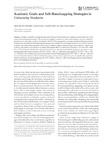Academic goals and self-handicapping strategies in university students

No accesible hasta 9999-99-99
Use este enlace para citar
http://hdl.handle.net/2183/35003Colecciones
- Investigación (FEDU) [938]
Metadatos
Mostrar el registro completo del ítemTítulo
Academic goals and self-handicapping strategies in university studentsFecha
2016-05-23Cita bibliográfica
Ferradás, M., Freire, C., Valle, A., & Núñez, J. (2016). Academic Goals and Self-Handicapping Strategies in University Students. The Spanish Journal of Psychology, 19, E24. doi:10.1017/sjp.2016.25
Referenciado por
Elliot, A.J., Sommet, N. Integration in the Achievement Motivation Literature and the Hierarchical Model of Achievement Motivation. Educ Psychol Rev 35, 77 (2023). https://doi.org/10.1007/s10648-023-09785-7 Aloka, P. J. O., Ossai, O. V., & Amedu, A. N. (2022). Relationship between self-handicapping and academic buoyancy among final year students in secondary schools. EUREKA: Social and Humanities, (4), 58-66. https://doi.org/10.21303/2504-5571.2022.002451
Resumen
[Abstract] In highly competitive settings like university, the fear of failure leads some students to protect their self-worth using self-handicapping strategies. The present investigation examines to what extent academic goals are related to those tactics in university students. Specifically, MANCOVA was applied to estimate statistical differences linked to behavioral and claimed self-handicapping strategies according to the level (high/medium/low) of four types of academic goal (achievement approach, achievement avoidance, mastery approach, and work avoidance). Degree, year in school, and gender were entered as covariates. 940 students (86.5% women) from University of A Coruña (M = 20.44; SD = 1.73) participated. Results show that: (a) both behavioral and claimed self-handicapping are promoted by egooriented goals (achievement avoidance, F(2, 937) = 23.56, p < .001, ηp 2 = .048; achievement approach, F(2, 937) = 7.49, p < .001, ηp 2 = .016); (b) work avoidance goals are related to behavioral self-handicapping (F(2, 937) = 9.09, p < .001, ηp 2 = .019), but are not statistically linked to claimed self-handicapping; and (c) mastery approach goals are significantly, negatively related to both types of self-handicapping (F(2, 937) = 20.09, p < .001, ηp 2 = .041). Psychological and educational implications of the findings are discussed.
Palabras clave
Academic goals
Behavioral self-handicapping
Claimed self-handicapping
University students
Behavioral self-handicapping
Claimed self-handicapping
University students
Versión del editor
Derechos
Copyright © Universidad Complutense de Madrid and Colegio Oficial de Psicólogos de Madrid 2016
ISSN
1138-7416





